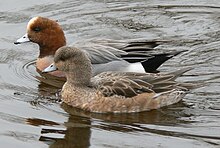Mareca is a genus or subgenus of ducks in the family Anatidae that includes the wigeons.
| Mareca | |
|---|---|

| |
| Eurasian wigeon, Mareca penelope | |
| Scientific classification | |
| Domain: | Eukaryota |
| Kingdom: | Animalia |
| Phylum: | Chordata |
| Class: | Aves |
| Order: | Anseriformes |
| Family: | Anatidae |
| Tribe: | Anatini |
| Genus: | Mareca Stephens, 1824 |
| Type species | |
| Anas penelope Linnaeus, 1758
| |
| Synonyms | |
| |
The species now placed in this genus were formerly placed in the genus Anas. A molecular phylogentic study comparing mitochondrial DNA sequences published in 2009 found that the genus Anas, as then defined, was not monophyletic.[1] Based on the published phylogeny, the genus Anas was split into four monophyletic genera with five extant species moved into the resurrected genus Mareca.[2]
The genus Mareca was introduced by English naturalist James Francis Stephens in 1824. The type species is the Eurasian wigeon.[3][4] The name of the genus is from the Portuguese word Marreco for a small duck.[5]
Extant species
editThe genus Mareca contains these species:[2]
| Common name | Scientific name and subspecies | Range | Size and ecology | IUCN status and estimated population |
|---|---|---|---|---|
| Gadwall | Mareca strepera (Linnaeus, 1758) |
Europe, Asia and central North America |
Size: Habitat: Diet: |
LC
|
| Falcated duck | Mareca falcata (Georgi, 1775) |
Eastern Asia | Size: Habitat: Diet: |
NT
|
| Eurasian wigeon | Mareca penelope (Linnaeus, 1758) |
Europe and Asia |
Size: Habitat: Diet: |
LC
|
| Chiloé wigeon | Mareca sibilatrix (Poeppig, 1829) |
Southern South America |
Size: Habitat: Diet: |
LC
|
| American wigeon | Mareca americana (Gmelin, JF, 1789) |
North of Canada and Alaska and also in the Interior West through Idaho, Colorado, the Dakotas, and Minnesota, as well as eastern Washington and Oregon |
Size: Habitat: Diet: |
LC
|
Fossils
edit| Image | Scientific name | Common name | Distribution |
|---|---|---|---|
| Mareca marecula† | Amsterdam wigeon | Extinct, formerly found on Île Amsterdam in the French Southern and Antarctic Lands |
Phylogeny
editCladogram based on the analysis of Gonzalez and colleagues published in 2009.[1]
References
edit- ^ a b Gonzalez, J.; Düttmann, H.; Wink, M. (2009). "Phylogenetic relationships based on two mitochondrial genes and hybridization patterns in Anatidae". Journal of Zoology. 279 (3): 310–318. doi:10.1111/j.1469-7998.2009.00622.x.
- ^ a b Gill, Frank; Donsker, David, eds. (2017). "Screamers, ducks, geese & swans". World Bird List Version 7.3. International Ornithologists' Union. Retrieved 23 July 2017.
- ^ Stephens, James Francis (1824). General zoology, or Systematic natural history, by the late George Shaw. Vol. 12 Part 2. London: Printed for G. Kearsley. p. 130.
- ^ Mayr, Ernst; Cottrell, G. William, eds. (1979). Check-list of Birds of the World. Vol. 1 (2nd ed.). Cambridge, Massachusetts: Museum of Comparative Zoology. p. 460.
- ^ Jobling, James A. (2010). The Helm Dictionary of Scientific Bird Names. London: Christopher Helm. p. 241. ISBN 978-1-4081-2501-4.